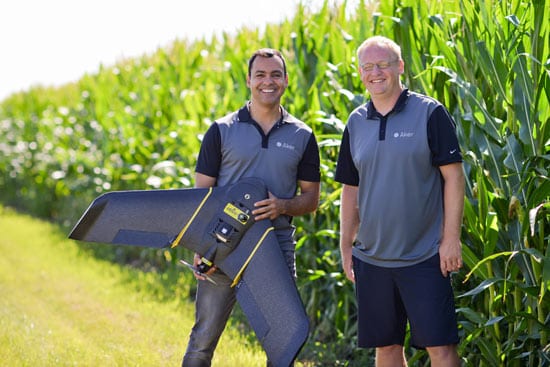Meet Our IN2 Cohort: Aker
The Donald Danforth Plant Science Center is partnering with Wells Fargo and the National Renewable Energy Laboratory to participate in the Wells Fargo Innovation Incubator, IN2. The first ag cohort of companies will collaborate with our Principal Investigators to test their technologies. We will be sharing the stories behind these companies in a blog series throughout the summer.
There are approximately 900 1 million acres of farmland in the US and less than two percent2 of the population directly works on farms. To ensure profitability, farmers and agronomists need to regularly scout their fields to ensure their crops are not being damaged by pests and diseases. This process takes countless hours and comes with a large margin of error.
It’s clear that there is a huge need for automating and digitizing the process for scouting and monitoring crops. Orlando Saez, CEO and co-founder of Aker, has a vision for a new technology that can help farmers get information about pests and diseases quickly and accurately.
Aker’s technology captures masses of digital images, collected from above and below the growing canopy, and analyzes them to turn the data into information about what pests are causing damage in specific fields at a given moment in time. Aker has developed probe equipped with an array of computer vision and environmental sensors that is small enough too be mounted on drones that can fly below the canopy to see damage below the top surface of plants, along stems, and under leaves. While Aker’s current technology provides useful insect pest information, they will expand to early detection of diseases with the help of IN2 and the Danforth Center.
The inspiration for Aker came out of a trip when Orlando and his co-founder and farmer Todd Golly visited the Dominican Republic in 2015. Orlando’s aunt, an agronomist herself, invited him to give a talk to other agronomists and farmers about the benefits of precision farming technologies. Orlando and Todd met with leaders from the ag innovation ecosystem where they learned about the extent of insect pest and disease damage to crops, and the high volume of pesticides that farmers rely on each season. Pesticides are costly to farmers and are applied after gathering limited data, and usually not applied where most needed in an attempt to save operational costs. In both cases, farmers lose money as yields and quality suffer.
Out of that trip to the Dominican Republic, Aker was born in 2016. Aker provides farmers, agronomists, pathologists and entomologists with critical data both to identify pests and forecast how they will spread to enable decisions before, during, and after growing seasons.

At the Danforth Center, Aker will collaborate with Principal Investigators Malia Gehan, Ph.D. and Becky Bart, Ph.D. Malia trained as a plant molecular biologist and her research focuses on understanding how plants grow and thrive under harsh environmental conditions. Malia’s research takes advantage of the automated plant phenotyping facilities available at the Danforth Center. While working with high-throughput phenotyping technologies, she has found that the ability to capture millions of plant images has created a new challenge: how to extract useful information from huge collections of digital images. As a result, her group currently focuses on developing software tools for image analysis and information extraction.
Becky Bart focuses on biological stresses, and in particular the three-way interactions among hosts, disease organisms, and the environment. Typical host-pathogen interactions are exquisitely specific, with specific genes controlling physiological responses based on recognition between host and disease organism. Environmental impacts on host/pathogen interactions and resulting disease outcomes are less specific and require large scale data sets to tease out the genes controlling environmental responses and the ultimate expression of disease damage.
Like all good scientists, Becky and Malia bring their curiosity and inquiring minds to this new collaboration between Aker and the Danforth Center. They are motivated by the opportunity to work with Orlando and his team to translate plant science research into solutions that will help feed the planet.
References: